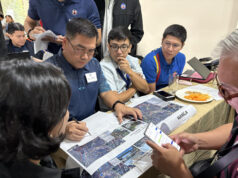CLARK FREEPORT – The Foundation for Economic Freedom, Inc. (FEF) expressed yesterday “serious concern” over the proposed Constitution drafted by the Puno Consultative Committee, saying it contains the same “restrictive and protectionist provisions” of the current Charter.
In a statement, FEF said “these provisions have been responsible for the country’s historically inferior growth relative to the economic aspirations of the broader Filipino population and relative to the country’s neighbors.”
“These have sent strong signals to foreign investors that they are not welcome to invest in the Philippines to create jobs, transfer technology, provide healthy competition, and improve the lives of Filipinos,” FEF said.
The foundation cited the proposed federal Charter’s Article XV Section 3 which says that “private corporations or associations whose share of stocks are owned or controlled at least sixty percent by Filipino citizens, may lease not more than one thousand hectares of alienable lands of the public domain for a period not exceeding 25 years, renewable for another 25 years.”
It also cited Section 4 of the proposed Constitution the exploration, development, and utilization of natural resources which foreign investors could undertake only by entering into “co-production, joint venture, or production-sharing agreements with Filipino citizens, or entities at least 60 percent of whose voting capital is owned by Filipino citizens” for renewable period of 25 years.
FEF also expressed objection to Section 12 which provides that “ownership and management of mass media shall be limited to citizens of the Philippines, or to corporations, cooperatives or associations, wholly-owned and managed by such citizens” and that “only Filipino citizens or corporations or associations at least 70 percent of whose voting capital is owned by such citizens, shall be allowed to engage in the advertising industry.”
The proposed Charter also objected to other proposals that limits to only 40 percent the foreign investments in public transportation and education, the group noted.
FEF cited the proposal that says “no educational institution shall be established exclusively for aliens and no group of aliens shall comprise more than one-third of the enrollment in any school.”
The proposal, however, provides that such limitation “shall not apply to schools established for foreign diplomatic personnel and their dependents and, unless otherwise provided by law, for other foreign temporary residents.”
The proposed Charter also exempts schools “established by religious groups and mission boards.”
In its statement, FEF said the proposed Constitution “does not fulfill the change that President Duterte promised.”
“Instead, it retains the present restrictive provisions in the current Constitution and signals that change will only happen if and when Congress sees fit. In the case of the exploration and development of natural resources, the draft is even more restrictive in casting in doubt the possibility of 100 percent ownership under a Financial or Technical Assistance Agreement (FTAA),” FEF noted.
FEF proposed that “the default provisions not be restrictions but allow Congress to regulate the entry of foreign investments as conditions, including public welfare and national interest, warrant.”
“Through this suggestion, we are following the practice of other countries which do not put such restrictions in their Constitutions but legislate them, allowing for flexible responses to changing conditions. Moreover, by removing these restrictions in the fundamental law of the land, we are signaling that change has happened and we are open to investment, foreign or local,” the group stressed.
FEF also said that “the limitation on ownership of mass media entirely to Filipino citizens seems irrelevant in the age of the Internet when Filipinos consume their mass media from foreign companies, such as Facebook, Netflix, CNN, Twitter, and Youtube.”
“We also contend that provisions mandating preference to Filipinos in the “grant of rights, privileges, and concessions covering the national economy and patrimony” may be interpreted as keeping out foreigners to promote insularity, protectionism and worse, mediocrity and monopoly,” the grooup added.
FEF lamented that the draft Constitution does not project the Philippines as a modernizing country embracing the future but rather projects it as backward-looking, anti-modernist, and protectionist.”



